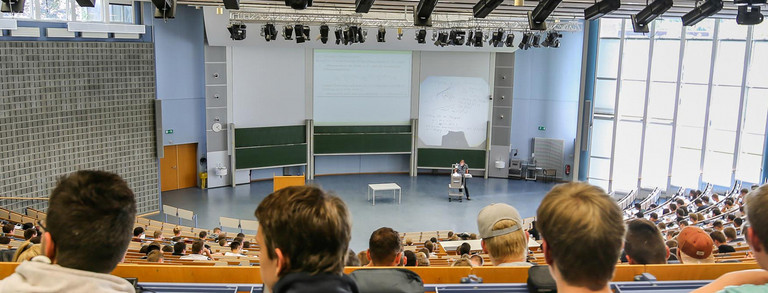Degree Programs from A to Z
The research-oriented, bilingual Master’s degree program in Applied Literary and Cultural Studies qualifies students for fields of activity that require in-depth knowledge in the area of literary and cultural studies. In addition to the qualification of the Bachelor’s degree program, it provides the ability to work scientifically. This opens up further career opportunities in the university sector and at scientific research institutes.
to the degree program Applied Literary and Cultural Studies (Master of Arts (M.A.))
The bilingual degree program in Applied Literary and Cultural Studies facilitates interdisciplinary study. In addition to the bilingual core subject, German and English/American Literary and Cultural Studies, students study one or two minor subjects. The program focuses above all on intercultural and interdisciplinary questions and – in addition to an internship related to the professional field and an integrated semester abroad – allows students to participate in interdisciplinary and internationally oriented study projects from the first semester onwards.
to the degree program Applied Literary and Cultural Studies (Bachelor of Arts (B.A.))
The bilingual Bachelor’s degree program in Applied Linguistics centers on language analysis and the application of linguistics theories in various fields, e.g., sociolinguistics, computer linguistics and foreign language teaching. The program deals both with the theoretical aspects of language as well as its various functions and applications. The consideration of interculturality and bilingualism plays an important role in this context.
to the degree program Applied Linguistics (Bachelor of Arts (B.A.))
The International Master of Advanced Methods in Particle Physics (IMAPP) is a joint program of the University of Bologna (Italy), the University of Clermont Auvergne (France) and the TU Dortmund University (Germany), supported by internationally renowned partner institutions. The program focuses on experimental and theoretical particle physics.
to the degree program Advanced Methods in Particle Physics (Master of Science (M.Sc.))
The Master’s degree program in Business Administration and Economics offers the possibility of specialization in a particular professional field. It can be connected seamlessly to the Bachelor’s degree program, but can also be taken up after a period of practical work experience and appeals to all those who value a practice-oriented, interdisciplinary and internationally oriented education with numerous options.
to the degree program Business Administration and Economics (Master of Science (M.Sc.))
The education in the English-language specialization Process Systems Engineering enables students to design and operate complex chemical and biochemical production systems with the help of mathematical models and modern computer tools for simulation and optimization. Graduates also master methods of control and production planning as well as the analysis and description of experimental data. Process engineers are in great demand on the market, as it gives the chemical engineer the opportunity to acquire all the knowledge necessary not only for the planning of a chemical plant, but also for its simulation and optimization.
to the degree program Process Systems Engineering (Master of Science (M.Sc.))





![[Translate to English:] Partner Four hands are holding the green logo of TU Dortmund University](/storages/tu_website/_processed_/1/d/csm_Partner_Nicole_Rechmann_KW_670eba0154.jpg)




![[Translate to English:] Forschung An apparatus with tubes in a laboratory](/storages/tu_website/_processed_/0/c/csm_Forschung_Juergen_Huhn_4fa3153b51.jpg)
![[Translate to English:] Studium Five students are sitting in a lecture hall. They are talking to each other.](/storages/tu_website/_processed_/c/9/csm_Studium_FelixSchmale_dbdbfb0dd7.jpg)





